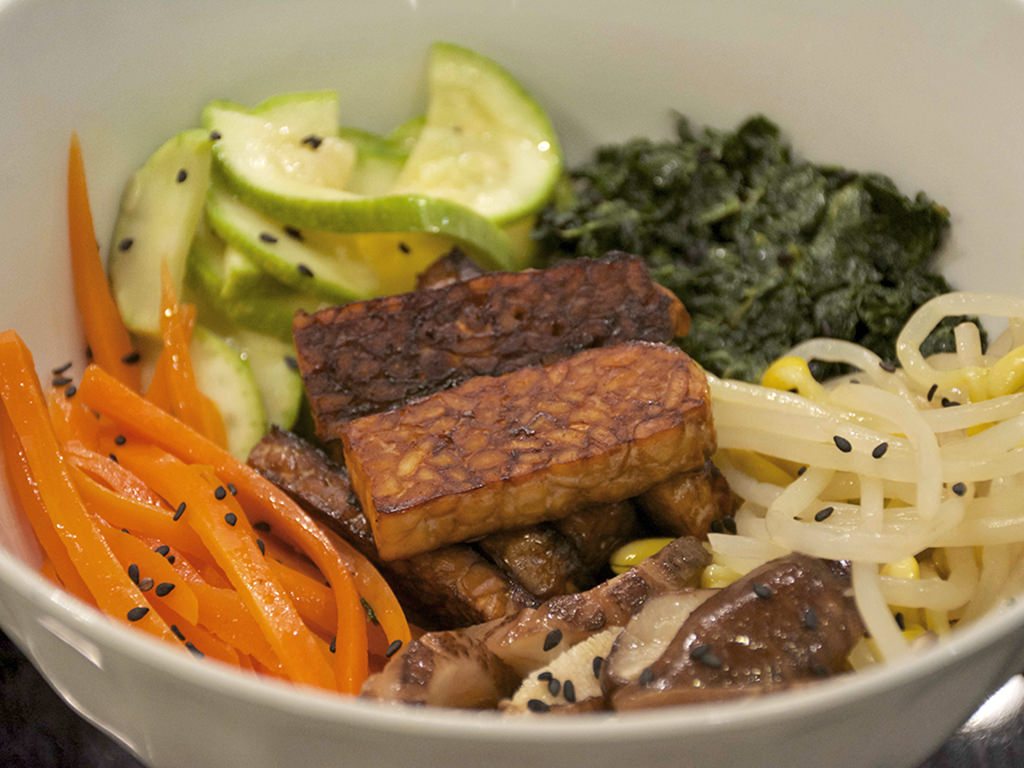3 Mins Read
Our first bowl of bibimbap was over 15 years ago during college in Philadelphia. Us college gals were looking for an alternative to the deep fried, sugary junk the university cafeteria specialized in. We had this idea that Asian food was lower-calorie and healthier. To be honest, despite growing up in Hong Kong, I had never explored Korean food much. The first time I tried Dolsot Bibimbap (the hot stone bowl version), with its raw egg, crispy rice and pungent, savory red paste, I was hooked. Bibimbap dinners became a weekly date with my roommate, who also became obsessed with this traditional Korean dish during the rest of our time at uni. Not much has changed today, except that Bibimbap is now a meal I can proudly make from scratch. We make this plant-based version for family dinner at least once a week. We forgo the traditional egg to keep it vegan. It’s everyone’s favorite. Not to mention that is the literal embodiment of eating the rainbow!
Notes: it goes without saying that you should get organic produce if possible and make sure it’s washed before starting! Honestly, you can play with the quantities, especially on the tempeh front. One pack works when we are not super hungry but sometimes we do need two. For the veggies, the key is to keep them crunchy so don’t over steam them. Use the photos to get an idea of how to chop/cut them.
Makes 4 Full Bowls
Ingredients
- 1 cauliflower head
- 1 cup frozen spinach, cooled to room temperature (let sit in colander)
- 1 carrot, peeled sliced in thin sticks (not shredded)
- 1 zucchini, skin-on, sliced in rounds and halved
- 1 cup soy bean sprouts
- 2 cups fresh shitake mushrooms, sliced
- 1-2 blocks of tempeh, sliced
- 3 tbsp extra virgin olive oil
- 1+1/4 tbsp toasted sesame oil
- sea salt
- coconut aminos
- 1+1/2 tbsp Tamari soya sauce
- gochujang (Korean spicy paste), we love locally made Divine Marinade‘s version
Directions
To Make The Cauliflower Rice
- Cut the cauliflower in half and remove the core.
- Using a food processor, process the cauliflower until it looks like rice (about a minute).
- On a medium flame, heat a frying pan with two tablespoons of olive oil and saute the cauliflower rice for three to four minutes. Season with sea salt to taste.
To Make The Bibimbap Veggies
- Steam each vegetable separately. For spinach, zucchini and bean sprouts, 2 minutes is more than enough. For mushrooms and carrots, 3 to 4 minutes works.
- Allow all veggies to cool to room temperature in separate bowls. For the spinach, make sure to squeeze out excess water.
- Once cooled, season each bowl of veggies with 1/4 tablespoon of sesame oil and sea salt to taste.
To Make The Tempeh
- Slice the tempeh and place in a flat dish.
- Cover with the Tamari and let marinate for at least an hour (up to 4 hours works too).
- When ready to cook, heat a frying pan with a tablespoon of olive oil and fry the tempeh slices flat (about 1-2 minutes per side). Make sure each tempeh slice has its own space in the pan. Fry in batches if your pan isn’t large enough to fit all the slices flat.
To Assemble The Bibimbap Bowl
- In each individual bowl, add a few spoons of cauliflower rice.
- Add a pile of each veggie in a circular pattern.
- Put a few tempeh slices in the center of the circle.
- Serve with a large spoonful of gochujang on the side.
All images courtesy of Green Queen.








